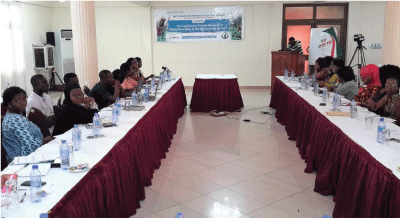Welcome - APSP
USAID Agriculture Policy Support Project (APSP)
Background
A key constraint to investment in Ghana’s agriculture sector is the inability of policymakers to identify reforms that would improve the food security enabling environment. These reforms need to be anchored on an effective and evidence-based policy analysis and be supported by civil society organizations and other agriculture sector stakeholders as a result of a permanent, transparent, and inclusive dialogue process.
Project Duration
December 2013 – September 2018
Implementing Partner
Chemonics International Inc., with Iowa State University (ISU)
Project Summary and Goal
Feed the Future’s Ghana Agriculture Policy Support Project (APSP) is a 5-year project which seeks to improve food security and enhance the environment for private sector investment in agriculture. In collaboration with other Feed the Future projects and other development partners, APSP works to strengthen the agriculture policy process, based on the policy agenda of the Government of Ghana through the Ministry of Food and Agriculture (MoFA). By supporting the effective engagement of the public and the private sectors on discussions about the agriculture policy process, APSP will contribute to USAID’s overall goal of fostering broad-based, sustained, and inclusive economic growth in Ghana.
Project Components
- Policy formulation and implementation is focused on improving the policy process of evidence-based decision-making related to food security;
- Policy Research is focused on increasing the availability of rigorous policy analysis and capacity for evidence-based policymaking and;
- Policy Advocacy is focused on building the capacity of civil society and farmer based organizations to strengthen and amplify their voice in the agriculture policy process.
Selected Achievemens and Outcomes
- APSP is supporting the implementation of MoFA’s flagship Planting for Food and Jobs (PFJ) program by facilitating the establishment of a secretariat for coordinating, monitoring and adjusting the activities of the PFJ. Has recently collaborated with MoFA by embedding a Senior Advisor on Rice Seed, now incorporated as a long-term PFJ’s Secretariat staff; also, APSP and FinGAP are together financing the training of over 200 staff of 210 licensed buying companies to support the PFJ’s marketing pillar. APSP will provide technical assistance to the PFJ Secretariat through June 2018.

- APSP is assisting the Government of Ghana in developing its technical framework to guide agriculture investment programs, such as the; Medium-Term Agriculture Sector Investment Plan III (METASIP) and the Ghana Integrated Plan for Agriculture Development (GIPAD) also dubbed as the “Marshall Plan for Agriculture”.
- APSP is providing training and mentoring of MoFA’s Policy Planning, Monitoring and Evaluation Directorate (PPMED) staff to build MoFA’s human and institutional capacity to carry out rigorous agriculture policy analysis. Main areas of the coaching include training on the policy cycle, development of policy briefs and data management, all in line with APSP’s strategy to create a cadre of policy specialists at MoFA.
- APSP is working along with selected academic and research institutions to strengthen their capacities to undertake research for evidence-based policy making and is encouraging their engagement with sector stakeholders to implement demand-driven agriculture policy research. Support includes training of researchers on an advanced statistical analysis and modelling application; thus, enhancing the quality of their technical work.
- APSP has provided technical assistance to Ghana Irrigation Development Authority (GIDA) to develop a private sector-friendly Irrigation Policy for Ghana. The policy will open the space for private sector investments in irrigation infrastructure development and management, improve access to irrigation water and use, reduce risks arising from unreliable rainfall conditions and promote year-round agriculture production to increase incomes and reduce poverty.
- APSP has implemented over 120 public-private policy dialogues to educate public and private sector stakeholders on the content, objectives and implementation of Ghana's agriculture policies, therefore enhancing mutual accountability in the policy-making process.
- Over 5000 Ghanaians have received training in key agriculture policies, policy analysis, policy advocacy, mobile agriculture data collection, gender policy advocacy, organizational management and program implementation.
- APSP has supported the Government of Ghana in improving the legal and technical framework to enable the private sector to develop, commercialize and use certified seeds to increase smallholder productivity and incomes, including the harmonization of the Seeds Regulations to ECOWAS protocols, the manuals on crop variety release, certification and accreditation, seed licensing, production of foundation seeds and is training over 20 seed enterprises on quality management for production of certified seeds.
- APSP has supported the formation of an umbrella association, the National Association of Seed Traders of Ghana (NASTAG) to spearhead the agenda to transform Ghana's seed industry. NASTAG has now become the leading private sector organization in Ghana, representing the voice of the seed industry;
- Assisted MoFA to develop a computer-assisted personal interviewing (CAPI) system and provided ICT equipment to strengthen the Statistics Research and Information Directorate's (SRID) management of agriculture data; therefore, contributing to the policy process by improving the quality of the data that goes into the analysis and generation of sector policies.
- APSP has partnered with over 40 civil society organizations, including the media, to strengthen their organizational and policy advocacy capacities to voice out their concerns on the needs to modernize agriculture and provide suggestions to enhance the agriculture policy process.
- APSP is working on over 25 pieces of agricultural food security enabling policies under various stages of implementation (public consultation, drafting, technical discussions, approval by corresponding authorities, submission to Parliament) as part of an unprecedented policy reform effort aimed at enhancing private sector investments in the agriculture sector.
Funding
US$ 15,068,137
Key Staff Contacts
Walter Nunez-Rodriguez
Chief of Party
wnunezr@agripolicyghana.org
